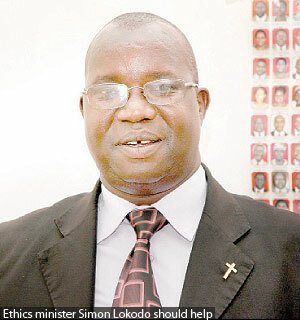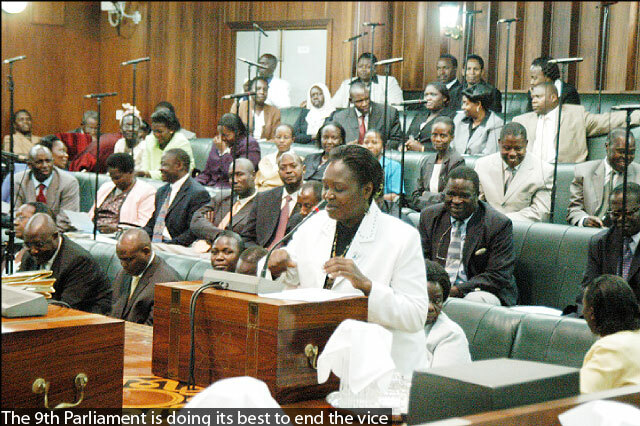Corruption blamed on lack of funds, citizens glorifying vice
More resources need to be made available to the anti-corruption agencies if the vice of corruption is to be wiped out of the country
By Saudha Nakandha More resources need to be made available to the anti-corruption agencies if the vice of corruption is to be wiped out of the country, Bishop Zac Niringiye, the chairperson of the African Peer Review Mechanism national governing council says.
More resources need to be made available to the anti-corruption agencies if the vice of corruption is to be wiped out of the country, Bishop Zac Niringiye, the chairperson of the African Peer Review Mechanism national governing council says.
He argues that inadequate resources and funding of especially the Auditor General’s office, the Inspectorate of Government and the Criminal Investigations Department has failed all effort in the fight against corruption in the country.
Niringiye says according to documentary evidence, corruption is most rife in procurement, privatisation, administration of public expenditure and revenue and in the delivery of public services.
This week from Dec 5-9 is the time when the world is celebrating the International corruption week, and the theme for this year is ‘Act against corruption Today.’ The celebrations are spearheaded by the United Nations Office on Drugs and Crime and the United Nations Development programme (UNDP).
Yesterday, local civil society and other movements all over the country against corruption celebrated as the culmination of the CSO national anti-corruption week celebrations.
The World Bank estimates that Uganda loses over sh500b per year to corruption. (4th October 2010)
 Qn: But what is the corruption level like in Uganda?
Qn: But what is the corruption level like in Uganda?
Recently Transparency International an NGO in ensuring transparency in the world ranked Uganda the 33rd most corrupt country in the world. This ranking comes a time when the country is battling out corruption scandals especially CHOGM and oil.
Apart from these scandals much has happened in the previous years, with the most pronounced being incidents such as MPs receiving sh20m each into their accounts purportedly for monitoring government projects in their constituencies, which happened immediately after they passed a huge supplementary budget at the peak of the election campaign.
For the public this transaction was termed as a bribe and some MPs were prompted to return the money.
Qn: Why the vice is rampant?
According to a study by transparency International in Kenya on the East African countries, the vice is common because the public have failed to report corrupt people to the authorities.
According to this study, the propensity to bribe and not report corruption cases fell from 64% in 2008 to 56% in 2009 in East Africa. In Tanzania only 8% of the bribery incidents were reported; indicating a lack of public confidence in the institutions which are supposed to address such complaints.
In Uganda the reporting pattern was quite low with 70% of those who paid bribes failing to report the incidents.
The top reasons given for not reporting bribery were a lack of faith that any action would be taken and a fear of intimidation.
Despite efforts by the media in highlighting corruption scandals in the country the vice has continued taking its routes into society. The New Vision in particular has published stories on corruption as they occur. On August 18, 2009 The New Vision published an article titled ‘Police officers held over receiving bribe’ but the practice has remained as the police force is ranked the most corrupt institution in the country.
The New Vision in particular has published stories on corruption as they occur. On August 18, 2009 The New Vision published an article titled ‘Police officers held over receiving bribe’ but the practice has remained as the police force is ranked the most corrupt institution in the country.
On December 4, The New Vision published an article ‘corruption feared in sh28b HIV deal’. Others stories like the follow up of the case against the Former Vice-President Prof. Gilbert Bukenya for his role in the CHOGM Motorcare deal that resulted into loss of billions of public funds have always been the lead stories of the paper. These and many other stories have been published, but not much has changed. The vice still goes on.
Many local government officials have lost their jobs following their alleged involvement in the bicycle saga that led to loss of billions of shillings meant for procuring bicycles for local council members.
Many scholars argue that the vice has been so pronounced in society because corrupt people are uplifted in the country.
Findings of a study carried out by Transparency International Uganda, indicates that a cross-section of people say if a corrupt official embezzled money and used it to develop their area that is considered fine compared to the one who selfishly takes it all for himself. This act is glorifying the corrupt.
Qn: Who is to blame for the rampant cases?
The public here has a role to play and the leaders themselves according to Eunice Musiime the programme coordinator policy at the Uganda National NGO Forum.
“The motivation for graft is largely for leaders to maintain themselves in office and they generate their resources for self-preservation through corruption,” she says.
She says the public is to blame for time and again they vote back corrupt officials into public offices. The public also hardly holds its leaders accountable for their actions.
Way forward
Many have blamed the Uganda Law Reform Commission for the weak laws in our country. They argue that such weak laws discourage whistle blowers, who fear being victimised unlike MPs who are protected from prosecution for any utterance while in a parliamentary session.
According to the APRM 2009 review report, Niringiye argues that Uganda has the best and programmes to promote development, but all have failed due to corruption, among other factors.
Government Institutions have been seen on many occasions trying to solve the vice by arresting those implicated, but all efforts are futile as no money swindled by the corrupt has been recovered.
Recently the Public Procurement and Disposal of Public Assets Authority (PPDA) suspended a deal where about sh28.4b was to be paid for over 200 CD4 count machines that senior officials in the HIV campaign in the Ministry of Health say were not a priority in the HIV budget.

The machines, which are used to measure the immunity of a person living with HIV, were supposed to be allocated to Health Centre IVs countrywide. But officials say the money should have been used to put more Ugandans on ARVs. This is one of those effort of the anti-corruption institutions in the country.
As Uganda struggles to end the vice others argue that advocating transparency in all public dealings might save the nation from this vice.
They suggest that if all those implicated in the Global Fund scandals are punished corruption would not be taken for granted in society.
For the CHOGM scandal many were implicated, but only one person has been placed before the court of law to answer charges.
Tough measures on those implicated in corruption cases should be taken. Measures like forcing them to refund the money so that it is put to its rightful use.
The Government, civil society organisations and the public need to join hands and fight corruption. It is every citizen’s duty as per Article 17(d) and (i) of the Constitution to fight the vice.
DIRECTORATE OF PUBLIC PROSECUTIONS
Fighting Corruption in Uganda